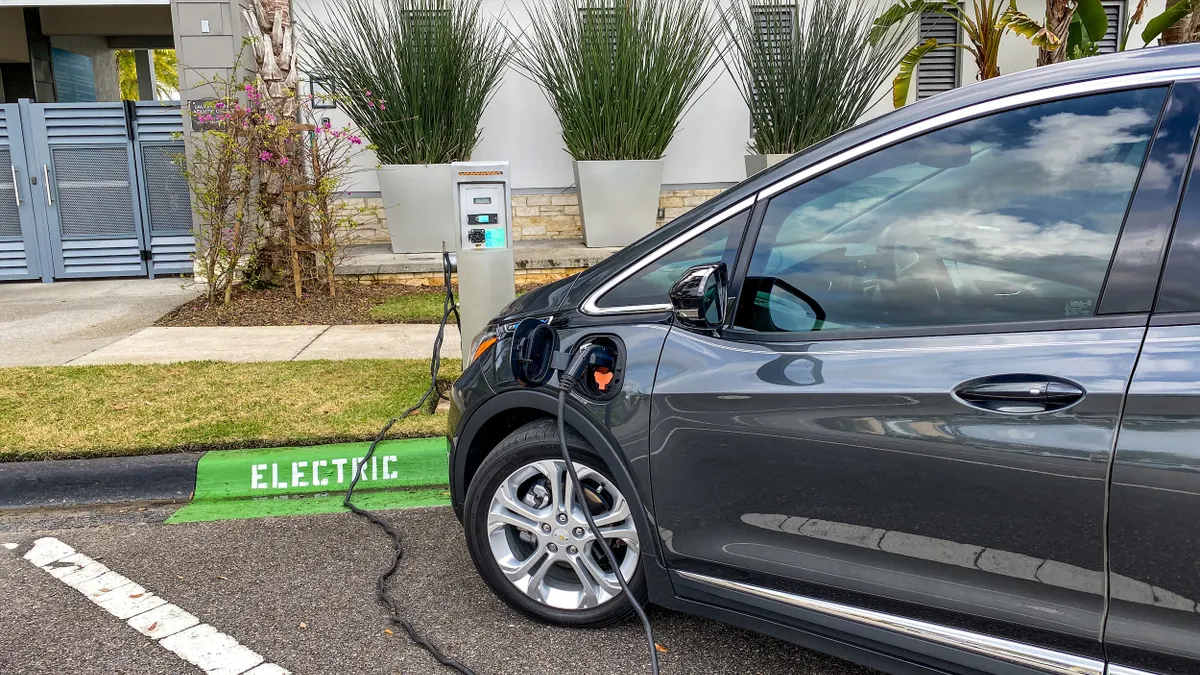The 2020 election has seen what may be the United States' highest voter turnout in over a century, with poll workers on track to count roughly 160 million votes total, NPR reports, representing 67% of the eligible voting population.
Ahead of the election, Smart Cities Dive identified 10 statewide ballot measures (of more than 120 nationwide) that could have implications on the development of smart and inclusive cities beyond 2020. Though some states are still counting votes as of publication time, the outcomes of those measures have been confirmed — and are detailed as follows.
PASSED: California Prop 22, App-based drivers as contractors question
Ride-hailing companies and others in the app-based gig economy spent big on Proposition 22 in California, which will override the state’s AB5 legislation that requires platforms like Uber and Lyft to classify drivers as employees. Passed in 2019, AB5 has been touted by some as a model for national legislation to secure driver labor protections, but ride-hailing platforms argue the viability of following this model for their own drivers' needs.
The clash over Prop 22 had brought in $218 million as of Oct. 26, making it "the most expensive ballot measure campaign in state history," the Los Angeles Times reports. Smart Cities Dive is taking a deeper look into the approval of this measure and will update this story as reporting continues.
PASSED: Arkansas Issue 1, Transportation sales tax continuation
Arkansas' Issue 1 amendment will permanently continue a 0.5% sales tax, set to expire in 2023, that directs revenue to state and local transportation initiatives for highways, roads and bridges.
The extended tax could generate $293.7 million in revenue over 12 months of collections, according to the Department of Finance and Administration. Seventy percent of those funds will be invested in state highways, 15% invested in county transportation, and the remaining 15% in city transportation.
PASSED: California Prop 24, Consumer data privacy law initiative
Proposition 24 in California will expand residents privacy rights under the 2018 California Consumer Privacy Act (CCPA), which was designed to enhance consumer protections around the use and sale of personal data.
The approval of this ballot initiative will expand that law’s powers by creating the California Privacy Protection Agency. This will place a series of requirements on businesses to prohibit the sharing of someone’s personal information upon their request and to give consumers the ability to opt out of their data being used for advertising or marketing, among other requirements. Businesses also will lose the ability to fix violations of these privacy requirements before being penalized for them.
The proposition comes amid an ongoing national debate about data privacy requirements. Supporters say the ballot initiative will help state law keep pace with advancements in technology, while opponents argued that it had too many loopholes benefitting big tech companies.
PASSED: Massachusetts Question 1: Vehicle data access requirement
Massachusetts' Question 1, which was overwhelmingly approved with 75% of the vote, will require manufacturers with telematics-equipped vehicles to have a standardized open data platform on models starting in 2022.
As car technology becomes more advanced, the platform will ensure vehicle owners and independent repair facilities can access mechanical data and run tests via a mobile app. Supporters of the measure say it "simply comes down to creating a level playing field for third-party repair and car part shops, who fear they are being boxed out by automakers," Boston.com reports.
A National Highway Traffic Safety Administration spokesperson had flagged concerns about this measure introducing vehicles to cyberattack vulnerabilities. Opposition to the initiative was led by the Coalition for Safe and Secure Data, which raised $26.5 million from donors including General Motors, Toyota Motor North America and Ford Motor Company. Backers of the Question 1 campaign raised $24.3 million, with proponents including the Auto Care Association and major parts manufacturers.
PASSED: Michigan Proposal 2, Electronic data search warrant amendment
Proposal 2 in Michigan, which also saw overwhelming approval with 88% of the vote, will amend the state constitution to require a search warrant to access a person's electronic data or electronic communications. The protections will be similar to those made for an individual’s home or papers, WWMT reports. Prior to this proposal, there was no direct reference to data access in Michigan’s constitution.
FAILED: California Prop 21, Local rent control initiative
California voters opposed Proposition 21, or the Local Rent Control Initiative, which was introduced to allow local governments to impose rent control on housing first occupied more than 15 years prior. The opposition of this measure will enable the continued prohibition of rent control on housing that was first occupied after Feb 1, 1995, according to Ballotpedia.
PASSED: Utah Constitutional Amendment A, Gender-neutral language amendment
Utah residents have approved a ballot measure to amend the state constitution to replace any gendered language with gender-neutral terms. Currently, the Utah Constitution contains references like the words "all men," but the passage of this amendment will alter that language to say "all persons."
Proponents say uniformity of language is needed in the state constitution to further advance local governments' efforts to support equity and inclusion. Of its 237 sections, supporters say there are six in the constitution where these technical changes are needed.
PASSED: New Mexico Bond Question B, Public libraries bond issue
New Mexico residents voted in favor of Bond Question B to issue over $9.7 million in bonds for updates to public libraries, public school libraries, tribal libraries and academic libraries. Bond Question B, which will advance the role libraries play in communities across the state, was passed by the state legislature as a bond package that includes $33.29 million for senior citizen facilities and $156.3 million for higher education.
PASSED: NJ Public Question 3, Delayed legislative redistricting amendment
In New Jersey, a constitutional amendment was passed to postpone the state’s legislative redistricting process until after the election on Nov. 2, 2021, if the state is to receive federal data from the 2020 census after Feb. 15, 2021.
The amendment will also keep the state’s current legislative boundaries in place until 2023 and use that delayed timeline in future redistricting processes if subsequent census data arrives after Feb. 15. Supporters say the delay would help mitigate the disruption of the COVID-19 pandemic, which impacted data collection in the 2020 census and left many communities concerned about an undercount.
PASSED: Rhode Island Question 1, Name change amendment
Rhode Island voters have approved a measure to remove references to "Providence Plantations" from the preamble and two articles of the state’s founding document. Currently, the state's official name reads the "State of Rhode Island and Providence Plantations."
Local governments have already taken similar steps to address such references. Providence Mayor Jorge Elorza signed an executive order in June removing the word "Plantations" from city documents and ceremonies, and Rhode Island Gov. Gina Raimondo had the word removed from state documents and stationery used by her office.
The passage of this measure will rename the state, which supporters say built its economy on the slave trade and must heal those wounds, to "State of Rhode Island."



















